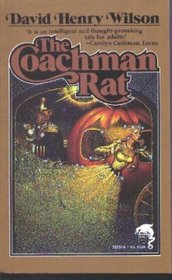This marriage of "Cinderella" and "The Pied Piper" was certainly a fast and entertaining read. In some ways it reminded me of _Ratatouille_ as well and I wonder if the screenwriters read this first. This fairy tale was fun - though it would probably be better for younger audiences. Then again, I suppose you can't really outgrow fairy tales. And while this isn't my favorite re-told fairy tale, it certainly wasn't bad. And the whole idea of the story was quite original.
Definitely not a 'happily ever after' fairytale, but interesting.
From Publishers Weekly
The British author of the Jeremy James children's books puts a spin on the Cinderella and Pied Piper myths and turns "happily ever after" upside down. The eponymous narrator, fascinated by man's power over the world, lets himself be caught in a nonlethal trap and is transformed by a "woman of light" into human form. He is now Robert, the coachman who drives Amadea (former scullery maid) to the Prince's ball in a gold coach (formerly a pumpkin) pulled by six white horses (once mice). At midnight they all revert to their original forms, but our hero can no longer communicate with rats; he can talk with humans, however. Robert searches for the woman of light, who appears after Princess Amadea and the Prince are killed by a mob. Transformed to coachman again, Robert plots revenge on the town. Employing armies of rats, his vendetta turns out disastrously for everyone, including the tormented Robert. Comparisons between men and rodents are effective, and the story has the simple, propulsive feel of a real fairy tale. But not for children.
From Library Journal
The fate of a young rat magically transformed for one brief night into a coachman takes on the air of heroic tragedy in this retelling (from a different point of view) of one of childhood's most famous fairytales. Set in a Europe on the verge of enlightenment, Wilson's somber portrayal of a creature trapped halfway between his animal origins and his new "human" awareness explores the shadowy aftermath of the phrase "and they lived happily ever after." First published in West Germany, this compelling fantasy is highly recommended for adult and YA fantasy collections.
The British author of the Jeremy James children's books puts a spin on the Cinderella and Pied Piper myths and turns "happily ever after" upside down. The eponymous narrator, fascinated by man's power over the world, lets himself be caught in a nonlethal trap and is transformed by a "woman of light" into human form. He is now Robert, the coachman who drives Amadea (former scullery maid) to the Prince's ball in a gold coach (formerly a pumpkin) pulled by six white horses (once mice). At midnight they all revert to their original forms, but our hero can no longer communicate with rats; he can talk with humans, however. Robert searches for the woman of light, who appears after Princess Amadea and the Prince are killed by a mob. Transformed to coachman again, Robert plots revenge on the town. Employing armies of rats, his vendetta turns out disastrously for everyone, including the tormented Robert. Comparisons between men and rodents are effective, and the story has the simple, propulsive feel of a real fairy tale. But not for children.
From Library Journal
The fate of a young rat magically transformed for one brief night into a coachman takes on the air of heroic tragedy in this retelling (from a different point of view) of one of childhood's most famous fairytales. Set in a Europe on the verge of enlightenment, Wilson's somber portrayal of a creature trapped halfway between his animal origins and his new "human" awareness explores the shadowy aftermath of the phrase "and they lived happily ever after." First published in West Germany, this compelling fantasy is highly recommended for adult and YA fantasy collections.
In the Halloween spirit Jim Wilson offers The Coachman Rat. A Cindrella based fairy tale that tells a grim fate of what happens to the carriage coachman after he was turned back into a rat. THIS IS NOT for children. Although it was well written and some would say entertaining I believe this tale is directed to a select group of readers and collectors of unusual versions of fairy tales. But yikes at my age I do believe it just may of damaged my psyche!!!




